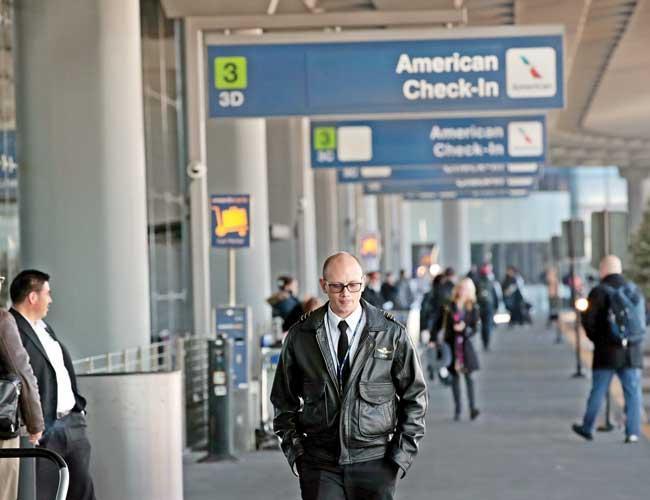
Ankara has voiced its disturbance over a substantial new travel advisory announced by the United States, urging U.S. citizens to reconsider travel to Turkey “due to terrorism and arbitrary detentions.”
The latest developments could further strain the relationship between the two NATO allies, already tense over a number of issues.
Turkey summoned U.S. Chargé d’Affairs Philip Kosnett in Ankara on Jan. 11 to voice its anger over the categorization of Turkey as a country with an “increased security risk” along with Sudan, Pakistan and Guatemala.
“We have expressed our disturbance with the inaccurate information posted in this travel advice,” a senior Turkish official told the Hürriyet Daily News.
The call was Kosnett’s second summoning to the ministry in less than 24 hours, following one on Jan. 9 to protest Washington’s continued military assistance to a Syrian Kurdish group that Ankara considers a terrorist organization.
The new travel advice posted on the website of the U.S. Department of State lists countries in the world under four standard levels of advice, depending on each country’s security conditions. The third category - in which Turkey is situated along with Pakistan, Sudan, Venezuela, Russia and Guatemala - urges U.S. citizens to reconsider travelling to these countries. The fourth category strictly advises U.S. citizens to avoid travel to the country and includes Yemen, Somalia, Mali, South Sudan and Syria.
‘Don’t travel to southeast’
The U.S. cited two justifications for its strong travel warning on Turkey: The continued risk of terrorism and the arbitrary detention of individuals under the ongoing state of emergency.
It called on U.S. citizens to avoid all travel to any areas along the Turkey-Syria border, as well as the southeastern provinces of Hatay, Kilis, Gaziantep, Şanlıurfa, Şırnak, Diyarbakır, Van, Siirt, Muş, Mardin, Batman, Bingöl, Tunceli, Hakkari and Bitlis due to terrorism.
“Terrorist groups continue to plot possible attacks in Turkey. Terrorist organizations explicitly target Western tourists and expatriates,” it stated, stressing that tourist locations, transportation hubs, markets/shopping malls, local government facilities, hotels, clubs, restaurants, places of worship, parks, major sporting and cultural events, educational institutions, airports, and other public areas may be potential targets.
It also added that these areas have been vulnerable to terrorist activities as well as kinetic actions by the Turkish security forces, recalling that “large-scale terrorist attacks including suicide bombings, ambushes, car bomb detonations, improvised explosive devices, as well as kidnappings for ransom, shootings, roadblocks and violent demonstrations” have occurred in these areas.
‘Politically motivated detentions’
The note posted on the State’s Department’s website also referred to the ongoing implementation of the state of emergency in Turkey, saying “security forces have detained individuals suspected of affiliation with alleged terrorist organizations based on scant or secret evidence and grounds that appear to be politically motivated.”
U.S. citizens have also been subject to travel bans that prevent them from departing Turkey, it urged, warning that participation in gatherings, protests, and demonstrations not explicitly approved by the Turkish government can result in arrest.
“The Government of Turkey has detained and deported U.S. citizens without allowing access to lawyers or family members, and has not routinely granted consular access to detained U.S. citizens who also possess Turkish citizenship. U.S. government personnel in Turkey are subject to certain security restrictions. Family members cannot accompany U.S. government employees who work at the U.S. Consulate in Adana,” it stated.
Ties between Ankara and Washington have undergone severe turbulence in recent months. A local employee at the U.S. Consulate General in Istanbul, Metin Topuz, was arrested on terror charges in October 2017, just ahead of a trial of a former Turkish state banker at a New York court on charges that he was helping an Iranian-Turkish businessman evade U.S. sanctions on Iran.
Turkey put in same league as Sudan, Pakistan
A number of other countries on the United States’ travel advisory list are also included in the third category, which includes Turkey.
Here are the countries cited as containing “Areas with Higher Security Risk,” which Washington advises its citizens to reconsider travelling to:
- Turkey
- Sudan
- Pakistan
- Guatemala
- Venezuela
- Russia
A number of African countries such as Niger, Nigeria, Mauritania and Chad are also in the third category but are not cited as containing areas with higher security risks.
In the fourth category are Iran, Syria, Iraq, Yemen, Somalia and North Korea, to which the U.S. urges its citizens to avoid all travel.